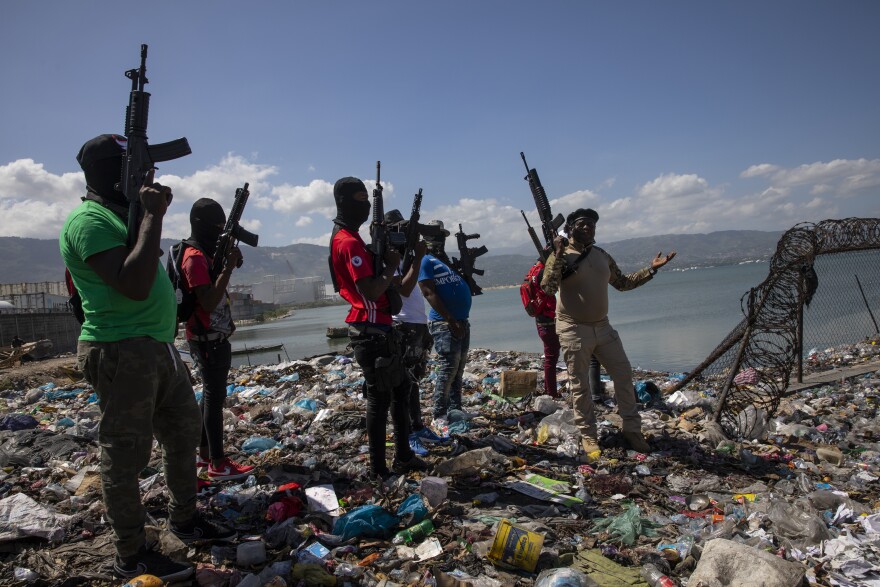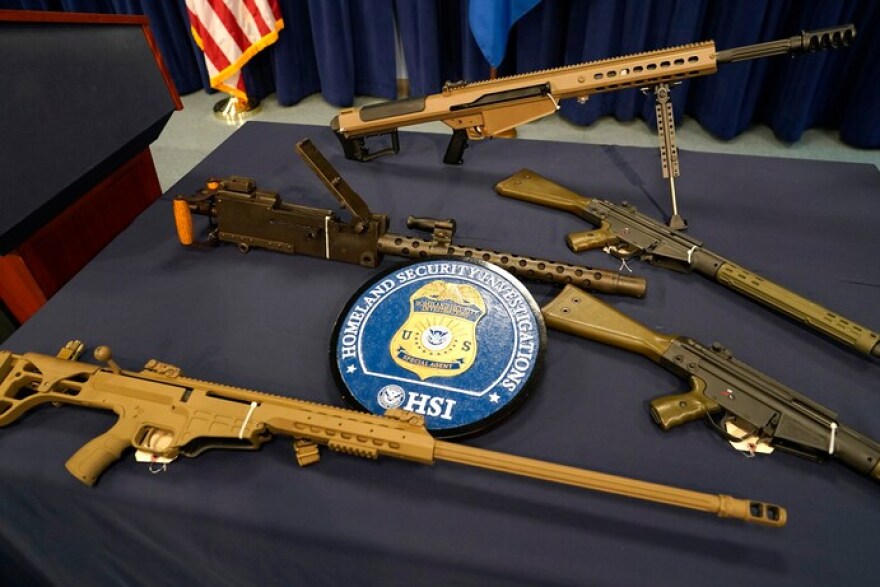The interim prime minister of Haiti last week formally requested a foreign intervention, amid spiraling gang violence that is blocking the transport of basic goods like gas and food.
Over the weekend, United Nations Secretary-General Antonio Gutteres backed that call, saying in a letter that the Haitian National Police “is faced with criminal gangs in possession of higher-caliber weapons and better equipment than its own.”
But support for the proposed international intervention is strongly opposed by many in South Florida’s Haitian community. More than 300,000 Haitians live in the state of Florida.
A pressure group, comprising of some of the most prominent individuals and organizations in the Haitian diaspora, held a press conference in Miami this week to call on President Biden to stop supporting the nation's government.
They warned that the intervention proposed by de-facto prime minister Ariel Henry would only entrench the grip on power of his unelected government, and would block the kinds of reforms needed to move the country forward.
“Intervention means that there will be no system change. Intervention means that people will not be able to fight for justice, for the just, transparent government that they want,” said Leonie Hermantin, the director of development and communication at the Sant La Haitian Neighborhood Center in Miami.
'The gangs were created by the same system'
On the ground, gangs control a majority of the Haitian capital Port-Au-Prince, according to USAID, U.S. federal government’s foreign aid agency.
The gangs have strategically blocked access to entire parts of the nation, leaving areas without fuel to power water stations and other services. It has led to an escalation of a sanitary crisis, with cholera reappearing in the nation after it had largely been eradicated.

“The gangs were created by the same system that is now saying, ‘Oh, you must send intervention because they’re out of control now.’ The same people who are asking for intervention are the same people who created, fueled, incubated those gangs,” added Hermantin.
She was referring to the connections between the proliferation of gangs and the political class that have been broadly reported.
A commissioner in the government of late-President Jovenel Moïse said in 2020 that the government proposed that gangs join forces because they felt it would be easier to negotiate with them as a bloc, rather than as separate entities. That confederation of gangs, known as G9, now controls broad swaths of the capital and has participated in civilian massacres.
Moïse was assassinated at his home in July of 2021. Days before his death, Moïse appointed de-facto Prime Minister Henry to the post.
The government of Ariel Henry has been strongly supported by President Joe Biden and other nations, including Canada and France, in what is known as the Core Group.
But Haitians who view the government as illegitimate have launched massive protests in recent weeks urging the U.S. to stop supporting it. Haiti has not held elections since 2016, and it currently has no operating parliament, court system or even mayorships.

Support for the Montana Accord
At the press conference, held in Little Haiti on Tuesday, the speakers echoed the calls of protesters.
They are pleading with the Biden administration to instead back a large group of economists, attorneys, professional associations, labor unions and religious leaders known as the Montana Accord.
That group has proposed forming a transitional government that, they say, would be perceived by Haitians as more legitimate and could stabilize the nation. Elections would be projected over the coming years.
“We no longer want the U.S. and its allies and our so-called friends, the so-called ‘Gang of 8’ to make decisions on our behalf,” said Marleine Bastien, the executive director of the Miami-based Haitian community organization Family Action Network Movement.
"Haitians are going to the newspapers and going to the streets to ask the U.S. to stop supporting and propping up the [government] and to let the Haitian people choose their own destiny. They alone can decide the best way to combat gang violence."
The Miami-based Haitian activists called on President Biden to meet with them to discuss a path forward. They cited the fact that the President met with Cuban-American activists days after major protests erupted in Cuba in July of 2021 to discuss U.S. policy towards the island.
“We have never been granted such a hearing,” said Hermantin, of the Sant La Haitian Neighborhood Center.
A coalition of more than 100 advocacy and religious groups wrote a letter to the Biden Administration last month, urging it to stop supporting Henry. Last week, several Democrats in the U.S. Senate and House wrote a letter to President Biden urging the same.
“The United States must take into account the voice of the Haitian people, including through groups such as the Montana Accord, even if Henry will not do so,” reads the letter from federal elected officials.
Meanwhile, Democratic Congresswoman Sheila Cherfilus-McCormick has called on the Biden Administration to sanction “oligarchs, political elites, high-level corrupt politicians, U.S. citizens, and U.S. residents who finance extrajudicial killings, torture, and kidnappings of innocent Haitian nationals and, in some cases, American citizens.”

As WLRN has reported, many of the firearms fueling the violence in Haiti come from smuggling operations that launch out of Florida.
Officials in the Biden Administration have so far thrown cold water on any direct U.S. intervention into Haiti, saying the calls for putting boots on the ground in Haiti are “premature.”
United Nations Secretary-General Gutteres said the UN would support a “rapid reaction force” headed by a yet-to-be-determined UN member-state, in order to help Haitian police “remove the threat posed by armed gangs and provide immediate protection to critical infrastructure and services.”
A long history of intervention
Many Haitian-Americans are wary of any foreign intervention in Haiti, of which there is a long history. U.S. Marines occupied the nation between 1915 and 1934, and U.S. troops again invaded the nation in 1994 in order to restore a democratically elected government.
The latest foreign deployment to Haiti was a United Nations peacekeeping mission, in the wake of the 2010 earthquake that killed more than 300,000 people. The UN later admitted that the mission brought about an epidemic of cholera, which killed an estimated 10,000 Haitians.
None of those missions brought the broad, systemic changes that many Haitian-Americans say are necessary to set the country up for long-term success, despite billions of dollars that have been spent.
Tessa Petit, a co-director of the advocacy group the Florida Immigrant Coalition, says the entrenched political powers and oligarchs see no benefit in changing the system.
“We have been subjected to other nations’ perception of what we should be, how we should be, what we should do,” added Petit. “It is insanity to do the same thing over and over again and expect different results. Is the Core Group insane? You’ve been doing this for decades, obviously it does not work.”

Regardless of whether the Henry government or the Montana Accord control the reins of power, or whether there is a foreign intervention or not, experts believe the security situation in Haiti will likely remain precarious for the foreseeable future.
Assistant Secretary of State Brian A. Nichols and a delegation flew to Port-Au-Prince on Wednesday to meet with Henry, members of the Montana Accord and other groups.
“The delegation will assess how the U.S. government can continue to provide various forms of assistance and promote accountability for those responsible for criminal acts,” Nichols said in a statement.
“The delegation will urge political actors to rise above their differences and chart a Haitian vision for improved security and return to a democratic order.”






